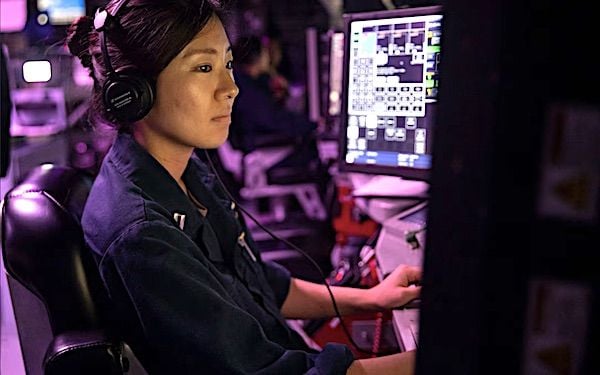As our adversaries across the globe become increasingly emboldened, it has never been more critical that America maintain its technological edge by investing in quantum computing. Air Force Research Lab’s Information Directorate in Rome, New York, has long been the epicenter of the Air Force’s quantum information science research and development efforts. For years, the lab has worked diligently to conduct critical applied research across many quantum technologies and drive the Air Force’s ability to maintain superior information technological advantage against our adversaries. It is time the Department of Defense (DoD) did the same. As quantum advantage approaches, we must prepare for it by ensuring our quantum computers are industrially useful and able to solve critical operational problems for the DoD.
In pursuit of this goal, the DoD must execute three critical lines of effort. First, it must fully embrace, and Congress must fully fund, the Defense Advanced Research Projects Agency’s (DARPA) Quantum Benchmarking Initiative (QBI) program. This program, in partnership with AFRL-Rome’s systems engineering and broad quantum expertise will benchmark industrial efforts to build a useful quantum computer. This novel effort has yet to be conducted anywhere else across government. DARPA’s innovative approach to running the QBI program is the most significant federal work done in quantum computing to date and must be fully supported within the DoD and by Congress.
Second, the DoD must craft and execute a strategic framework to guide its approach to follow DARPA’s effort. If quantum technologies are to become an integral component of our defense arsenal, the DoD must develop a deliberate approach to the development, prototyping, and scaling of quantum capabilities to solve operational problems. My language in this year’s House-passed National Defense Authorization Act (NDAA), would accomplish this by requiring the DoD to develop such a strategy in pursuit of this goal. It will be critical for the Senate to support this language and ensure it is included in this year’s final NDAA.
Third, it is imperative the DoD holistically engage with the quantum industrial ecosystem, academia, and interagency. Formed between AFRL-Rome, Brookhaven National Lab, industry partners large and small, and a robust system of universities and community colleges, the Empire State Quantum Network being formed in Upstate New York is a model for DoD to engage partners of all types to fully embrace quantum technologies.
Through the incredible work being done by DARPA, AFRL-Rome, and the U.S. quantum innovation ecosystem, we are getting closer to reaching that goal. By developing a ready quantum workforce, software applications, algorithms, and other capabilities in addition to hardware, we will fast-track the building of an industrially useful fault-tolerant quantum computer and maintain technological advantage over our adversaries. […]
— Read More: www.wnd.com
What Would You Do If Pharmacies Couldn’t Provide You With Crucial Medications or Antibiotics?
The medication supply chain from China and India is more fragile than ever since Covid. The US is not equipped to handle our pharmaceutical needs. We’ve already seen shortages with antibiotics and other medications in recent months and pharmaceutical challenges are becoming more frequent today.
Our partners at Jase Medical offer a simple solution for Americans to be prepared in case things go south. Their “Jase Case” gives Americans emergency antibiotics they can store away while their “Jase Daily” offers a wide array of prescription drugs to treat the ailments most common to Americans.
They do this through a process that embraces medical freedom. Their secure online form allows board-certified physicians to prescribe the needed drugs. They are then delivered directly to the customer from their pharmacy network. The physicians are available to answer treatment related questions.


